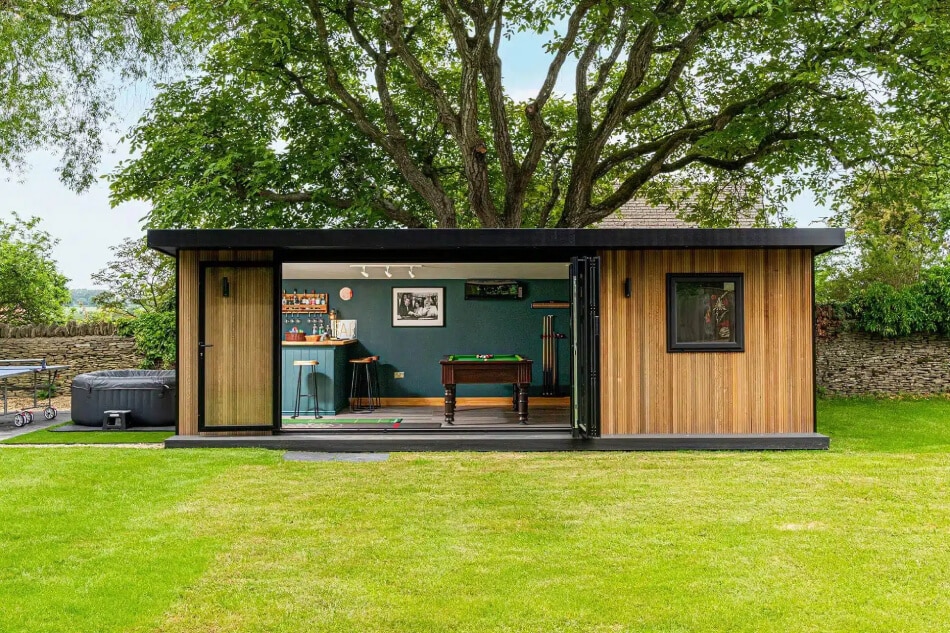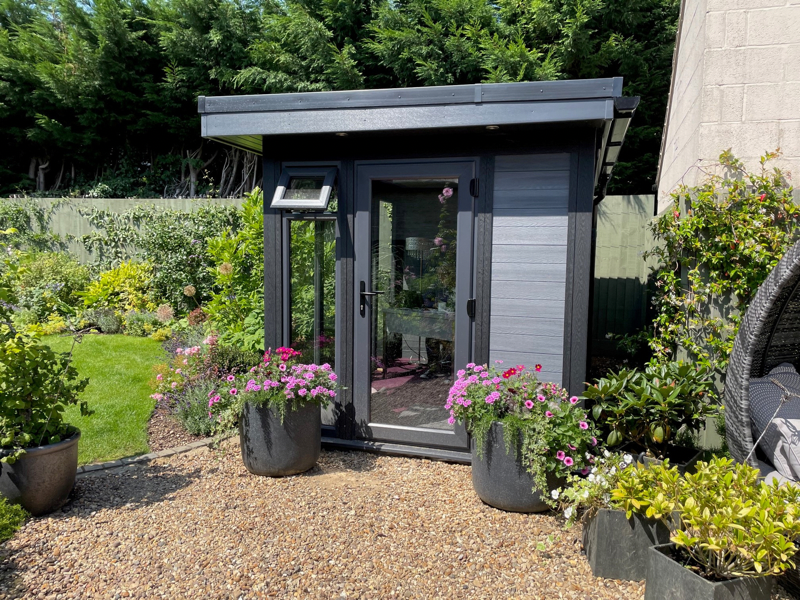Free Facts On Planning Permission For Garden Sheds
Free Facts On Planning Permission For Garden Sheds
Blog Article
What Kind Of Planning Permit Would You Need To Build An Outdoor Space Such As To Deal With Highway Issues?
Highway concerns can influence the necessity for planning approval when creating conservatories, garden rooms or outhouses. These are the most important concerns: Visibility and Sight Lines
Planning permission is required when the structure affects drivers' viewlines or intersects at bends or junctions of the road. The authorities for planning will assess whether the structure is a danger to the road.
Distance from the highway:
Planning permission is usually required for buildings that are built near to highways, for example extensions or front gardens. There are strict distance restrictions to ensure the building will not interfere with safe highway operation.
Access and Egress
Planning permission is required in the event that you wish to modify or build new access points. This will ensure that access and egress are safe and won't disturb the flow of traffic.
Parking Provision:
Planning permission is required when the proposed structure will require more parking or impacts existing parking. The planning authorities will examine whether the development will provide enough parking for the area and also if there are parking issues on the street.
Traffic Generation
Planning approval is necessary for any project which are expected to create traffic, such as gardens offices that customers are able to visit. The plan will assess how the impact of the local traffic flow and road safety are likely to impact.
Effect on Pedestrian Access
Planning permission is required when the proposed structure encroaches on the pavements or walkways for pedestrians. To ensure safety of pedestrians and accessibility, it is important to avoid blocking the path.
Construction Impact on Highways
A permit for planning may be required to mitigate the impacts of highway construction, such as high traffic volumes and temporary obstructions. Authorities for planning may establish requirements to minimize disruptions to the road network.
Drainage, Water Runoff, and Runoff
The development's impact on drainage and runoff, and specifically how it impacts the highway is another aspect to be considered. The proposed structure has to be approved by the planning authority in order to prevent flooding and drainage issues on the road.
Street Furniture and Utilities
A permit for planning is required for any construction that could impact street furniture, such as lampposts, signs or underground utilities like water pipes and electrical cables. The planning authority will coordinate with other agencies relevant to address these concerns.
Compliance with Highway Authority Guidelines:
Local highway authorities may have specific guidelines or rules for development near highways. Planning permits are required to comply with these regulations to maintain the safety of roads and improve efficiency.
Disturbance and noise from traffic
If the building being constructed could create more noise or disruption because of traffic, like a garden-office that receives visitors or customers, planning permits may be needed to evaluate and mitigate the impact.
Accessibility to public transport:
The planning permission must be obtained if the project could be detrimental to infrastructure for public transport, such as trains and bus stops. Planning permission will be required for projects that may affect public transport facilities, such as trains stations or bus stops.
In the end, road safety concerns are an important factor in the approval process of conservatories, garden rooms or extensions to the garden. It is crucial to make sure that any development does not adversely affect safety on the road as well as pedestrian access. Talking with the local planning authority and the highway authority early in the planning process will aid in addressing these concerns and help ensure that the development is in compliance with all relevant laws. See the top rated cost to run electrics to garden office for website examples including best electric heater for cabin, garden room vs extension, outhouse uk, do i need planning permission for a garden room with toilet, garden rooms hertfordshire, garden office hertfordshire, do i need planning permission for a garden room with toilet, garden room permitted development, garden office hertfordshire, what size garden room without planning permission and more.
What Kind Of Planning Permission Is Needed For Gardens, Rooms, Etc. In Terms Of Environmental Impact?
The impact on the environment of building gardens, conservatories, garden rooms or outhouses, as well as extension and garden offices can have a significant influence on the necessity of a planning permit. Here are key environmental considerations: Biodiversity:
If the proposed construction would impact wildlife habitats in your region, like local trees, hedgerows and ponds, then you'll need planning permission. It may be necessary to conduct an ecological survey in order to minimize and evaluate the impact.
Habitats and species that are protected:
Permission is needed when there are protected species on the site (e.g. bats, newts or other species), or if they are located in protected habitats or are near (e.g. Sites of Special Scientific Interest SSSI). In order to protect them the species, it is important to implement particular measures.
Preservation Orders for Trees Preservation Orders
Permission is required for removal or alter the condition of trees that are covered by TPOs. Local authorities will assess any impacts and could demand replacement planting or mitigation measures.
Flood Risk and Water Management
Planning permission for development in areas with high risk of flooding or near bodies of water is necessary. If the building is to be constructed, a flood risk assessment (FRA) that includes drainage solutions as well as an assessment of whether it is likely to increase risk of flooding, may need to be conducted.
Sustainable Construction Practices
You may need permission for planning to ensure that the construction and materials are sustainable. This is a way of assessing insulation and energy efficiency and carbon footprint of building materials.
Drainage and Surface water Runoff
Environmental considerations include the impact of a building's construction on surface water runoff as well as drainage. The planning permission will ensure that the drainage system is in place and prevents flooding or logging.
Stability of soil and soil
The planning permission is needed if the construction is likely to affect soil's stability or quality. This includes potential issues like soil erosion or subsidence, especially on sloped sites.
Air Quality
Any development that could have an impact on local air quality (such as near major roads or industrial areas), planning permission is required. This ensures that the levels of air pollution remain within acceptable levels, and mitigation measures are implemented.
Noise Pollution:
Planning permission is required when the garden area, or any extension to it, is likely to cause significant noise. The local authority evaluates noise levels as well as possible effects on the surrounding surroundings and the neighbors.
Waste Management:
Effective waste management throughout and post-construction is crucial. Planning permission provides adequate facilities for waste management and recycling to reduce the environmental impact.
Energy Efficiency:
Planning permission can include conditions for energy efficiency, such as the utilization of solar panels, high-performance glass, or other green technologies. This will reduce the impact of the building on the environment.
Environmental Regulations
Environmental laws and regulations are applicable to every development which includes the UK Environmental Protection Act. Planning permission guarantees that the development meets all legal requirements and the development is being environmentally sustainable.
Summary: Planning permissions for conservatories, gardens, or outhouses as well as garden extensions and offices must be determined by a range of environmental impacts. It is important to consult with local authorities before beginning the process of planning so that you are aware of the specific needs. This will ensure that the development is environmentally friendly and in line with the relevant laws. Check out the recommended heater for summerhouse for site tips including best electric heater for cabin, Tring garden rooms, garden out house, herts garden rooms, small garden office, garden rooms near me, costco garden buildings, out house for garden, costco garden buildings, how to lay decking on soil and more.
What Planning Permission Are You Required To Obtain For Garden Rooms Etc In Terms Of Location Restrictions?
If you're planning to build garden rooms, conservatories or outhouses, garden extensions or offices constraints on location play an important factor in determining whether planning permission is needed. Here are the key elements to take into consideration when choosing a location: Proximity to Boundaries:
A building that is less than 2 meters of the property limit must not exceed a maximum height of 2.5 meters. If the height exceeds the limits set by the law, a planning permit is needed.
The front of the property
Permitted development rights usually prohibit forward extensions or construction to front the principal elevation.
Side of the Property:
Side extensions are subject to height and width limitations, and could require planning permission if they are extended beyond the existing side wall.
The rear of the property
The size and height of rear extensions as well as garden rooms to the rear of the house is limited. Planning permission is required if these extensions are in excess of the permissible development limits.
Designated Areas
In National Parks (National Parks), AREAS OF OUTSTANDING NATURAL Beauty(AONB), and World Heritage Sites (World Heritage Sites) more stringent control is in place. Any new structure may need planning approval, no matter its size.
List of Listed Buildings
Buildings listed on the list are subject to strict rules. Planning permission is generally required for any new construction, modification or extension, no matter the location of the property.
Green Belt Land:
In order to maintain open spaces, it is extremely difficult to build on greenbelts. The construction of green belt land is restricted to preserve open space.
Flood Risk Zones
If the property is situated in an area prone to flooding, there are additional regulations to ensure that the proposed construction does not increase the risk. Planning permission and possibly a flood risk assessment may be required.
Urban vs. Rural settings
Urban settings often have different regulations than rural settings. Rural properties, for instance are likely to have more flexible restrictions on the placement and size of outbuildings. However, this could vary widely.
Highways, Public Rights of Way and Public Rights of Way
The structure might require planning permission in order to prevent obstruction of views, access or security if it is close to roads, highways or other rights-of-way for public use.
Shared Ownership and Leasehold Land
For leasehold properties or part of a shared ownership plan, additional authorization from the freeholder, or managing entity may be required, and planning permission may still apply depending on local regulations.
Other Structures in the vicinity:
Planning permission is required when the new structure is constructed next to an existing building or structure, particularly ones located on adjacent properties. This is to ensure that there is no negative effect on the land or buildings nearby.
To get advice on your specific property's circumstances and the location, it's recommended to talk to the local planning authority. Local laws can have an influence on the regulations. It is essential to adhere to all restrictions in order to avoid any legal issues or fines. View the most popular do garden rooms need planning for more info including garden out house, garden room conservatory, garden rooms near me, best heater for log cabin, insulated garden buildings, garden room heater, garden outhouses, costco garden rooms, small garden office, what is a garden room and more.